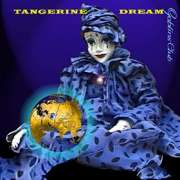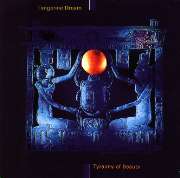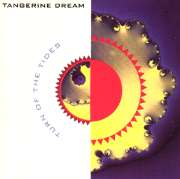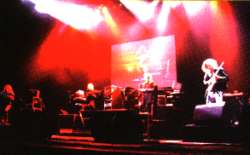Tangerine
Dream
in the Nineties
By: Jorge Munnshe & Montse Andreu.
This year (1997) is the thirtieth
anniversary of the founding of Tangerine Dream.
This band is one of the most legendary ones within the innovative
musics and has been a pioneer one in the use of synthesizers to
open up new artistic paths. TD have
revolutionized music by using electronic instruments to create a
new kind of music, beyond the minoritary experiments in laboratories,
while attracting a wide audience eager for new sensations.
 Goblins
Club is the most recent work by Tangerine Dream, in which
the line adopted by the band in the nineties continues to be followed,
although this time it enters a somewhat somber, dark path. Except
for the movie soundtracks, a terrain which has appeared to be the
best vehicle for the most avantgarde, revolutionary musical
expression of TD during a good part of the 1990s,
the rest of the works by this band can be labelled within a style very
much identified with Pop, yet curiously away from Techno, the
line that in a most obvious way combines Electronics with the
reach to a wider audience. While stepping aside from Kraftwerk
and their school in this way, TD write their own signature,
unmistakable in the musical world in general, just like their two
greatest electronic rivals, Vangelis and Jean Michel
Jarre, have likewise succeeded in doing.
Goblins
Club is the most recent work by Tangerine Dream, in which
the line adopted by the band in the nineties continues to be followed,
although this time it enters a somewhat somber, dark path. Except
for the movie soundtracks, a terrain which has appeared to be the
best vehicle for the most avantgarde, revolutionary musical
expression of TD during a good part of the 1990s,
the rest of the works by this band can be labelled within a style very
much identified with Pop, yet curiously away from Techno, the
line that in a most obvious way combines Electronics with the
reach to a wider audience. While stepping aside from Kraftwerk
and their school in this way, TD write their own signature,
unmistakable in the musical world in general, just like their two
greatest electronic rivals, Vangelis and Jean Michel
Jarre, have likewise succeeded in doing.
Within Tangerine Dream
there have existed several collectives of musicians. The most
durable formation and the one that shaped the prestige of TD
as a revolutionary band was the duo Froese & Franke,
with the participation of Peter Baumann and Johannes
Schmoelling. Since Christopher Franke
left the band in 1988, the steering wheel of the band has clearly been
in the hands of Edgar Froese, whose son has
joined him on a permanent basis in the nineties, besides other
more or less occasional musicians.
Given the recent release of Goblins
Club, the authors of this article have had a chance to talk
to Edgar Froese. The comments he has made in
this occasion, plus those he has expressed in several press
conferences, reveal different aspects about the path TD
have been following since 1988.
 One of the questions that generate most interest
is that of the status that Jerome Froese, Edgar's
son, has within the band. Jerome, who celebrates
his 27th birthday this year, being younger than the band, was in
the early 1970s the enigmatic child who appeared photographed as
part of the surrealist collages by Froese on
their album covers. The obvious pride of the father for his son,
as well as his obvious wish to have him involved in his artistic
projects, appear to have been fulfilled with the presence of Jerome
as a member of TD. Nevertheless, it must be noted
that the musical tastes of young Froese do not
tend to be expressed as much in accordance with the radical ideas
that shaped the reputation of the band, or those that his father reflected
in his solo works. This circumstance, and the fact that he is, or
has been, a fan of such artists and bands as The Cure, The
Mission, Siouxie and the Banshees, Sisters of Mercy, and Joe Satriani,
just as his father admitted, suggest that the path followed in
the 1990s by TD is linked to the presence of Jerome in
the band, as well as the obvious need for father and son to find
an intermediate terrain between their respective musical ideas,
which allows them to compose together in a viable way. However, Edgar
claims that their relationship within the band is a purely
musical one, without allowing their family ties interfere in any
way: "The fact that we both are on the same musical wavelength
today is a very positive and seldom circumstance. Musically, it
is certainly not a father / son relationship, but rather, we
respect each other as individual composers. And without any
family sentimentality. Jerome
is truly a natural talent." With respect to the instruments
in which Jerome focuses his attention most, his
father says: "The first thing Jerome
got when he was 14 was a complete drumset and he's become quite a
good drummer. He was later able to transfer this drumming
technique to the computer and thereby comes up with good drumming arrangements.
His guitar playing could be very good - unfortunately he is
missing more training, which I find kind of a pity. Keyboard is
his main instrument for composing and arranging. This is the most useful
support at the moment. And since he is an absolute computer
freak, he sometimes comes up with totally flipped out ideas,
which you'd never find in any book of music theory."
One of the questions that generate most interest
is that of the status that Jerome Froese, Edgar's
son, has within the band. Jerome, who celebrates
his 27th birthday this year, being younger than the band, was in
the early 1970s the enigmatic child who appeared photographed as
part of the surrealist collages by Froese on
their album covers. The obvious pride of the father for his son,
as well as his obvious wish to have him involved in his artistic
projects, appear to have been fulfilled with the presence of Jerome
as a member of TD. Nevertheless, it must be noted
that the musical tastes of young Froese do not
tend to be expressed as much in accordance with the radical ideas
that shaped the reputation of the band, or those that his father reflected
in his solo works. This circumstance, and the fact that he is, or
has been, a fan of such artists and bands as The Cure, The
Mission, Siouxie and the Banshees, Sisters of Mercy, and Joe Satriani,
just as his father admitted, suggest that the path followed in
the 1990s by TD is linked to the presence of Jerome in
the band, as well as the obvious need for father and son to find
an intermediate terrain between their respective musical ideas,
which allows them to compose together in a viable way. However, Edgar
claims that their relationship within the band is a purely
musical one, without allowing their family ties interfere in any
way: "The fact that we both are on the same musical wavelength
today is a very positive and seldom circumstance. Musically, it
is certainly not a father / son relationship, but rather, we
respect each other as individual composers. And without any
family sentimentality. Jerome
is truly a natural talent." With respect to the instruments
in which Jerome focuses his attention most, his
father says: "The first thing Jerome
got when he was 14 was a complete drumset and he's become quite a
good drummer. He was later able to transfer this drumming
technique to the computer and thereby comes up with good drumming arrangements.
His guitar playing could be very good - unfortunately he is
missing more training, which I find kind of a pity. Keyboard is
his main instrument for composing and arranging. This is the most useful
support at the moment. And since he is an absolute computer
freak, he sometimes comes up with totally flipped out ideas,
which you'd never find in any book of music theory."
Edgar
explains in this way how father and son decided to join their
talents within TD: "It was quite simple.
He was playing music just on his own before he joined the band,
and he gave me a tape one day, just to listen, and I must say
that I was pretty much astonished, because I didn't know that he
had gone that far already. And so I gave him a first piece to
work on, and he went better and better. And finally in 1990, he
was a co-composer of a record called 'Melrose', and he did
quality pieces on it, and still went on, you know, and so he's
been a member of the band since then. It's a very interesting collaboration."
 The place the other musicians currently have
within the Tangerine Dream of today is basically
oriented towards performance and to make some musical
arrangements for their respective instruments. About the many
musicians that have joined the band in these last years with a
longer or shorter permanence, Froese explains
that the reason for such a large traffic is due to the fact that TD
could not function with a stable formation of musicians since
each new project that Jerome and he himself undertake,
be it an album or a tour, happens to be very different from the
former ones, so that each one also requires different technical
and artistic tasks. "So we keep choosing people internationally
to colaborate with on certain productions. We simply need this
freedom."
The place the other musicians currently have
within the Tangerine Dream of today is basically
oriented towards performance and to make some musical
arrangements for their respective instruments. About the many
musicians that have joined the band in these last years with a
longer or shorter permanence, Froese explains
that the reason for such a large traffic is due to the fact that TD
could not function with a stable formation of musicians since
each new project that Jerome and he himself undertake,
be it an album or a tour, happens to be very different from the
former ones, so that each one also requires different technical
and artistic tasks. "So we keep choosing people internationally
to colaborate with on certain productions. We simply need this
freedom."
Many musicians have joined and left TD
since its foundation. Their contributions have characterized certain
stages in the history of the band. Christopher Franke
is considered by many TD fans the most important
creator of the "TD sound", apart from Froese. Franke
is mostly known thanks to his elaboration of the rhythmic
structure based on sequencers that, in the opinion of many fans,
is the most characteristic identity trait in the music of this
band. Asked about when the first time was that a sequence like
those in Phaedra was played by TD, Edgar
explains: "Besides guitar, I sometimes played bass
guitar with the formation The Ones
in 1966. Back then, we had those bizarre reverb and delays from the
German company Echolette. I
often played bass through this effect and I could get a sequencer effect
by the doubling delay of the bass notes. Even back then, I dreamed
of owning a piece of equipment which could be programmed and
which could produce notes with different lengths and pitch. And
it took seven years for this dream to come true."
With respect to the most recent
activities by TD, Edgar comments
what follows about Goblins Club: "In
this work we have tried to reflect a collective view onto the
Earth, as a somewhat critical description of the human race. Sometimes
you fear as though there are not many true humans on Earth, as if
they all are goblins, judging from the way we are treated, so
this is some sort of a description of our race. On the other
hand, I must say that some of the pieces in the album have a
funny story, as they were composed on a plane trip."
 We also asked him which his purpose was in recording
new versions of old themes by TD. "When doing
these remakes, with their corresponding remixes and their
remastering process, we have tried to make the music sound very fresh,
and with the best quality we have been able to give it. However,
since these tracks come from the earliest stages of Tangerine Dream,
it was quite difficult to enter the feelings and emotions of the seventies
and the eighties. The atmosphere surrounding a composition is very important,
and what we had in the mid seventies, in such themes as 'Stratosfear'
or 'Phaedra', was different from what it is today; and so the
pieces are sounding different. It is unavoidable that the style
of these new versions sounds different."
We also asked him which his purpose was in recording
new versions of old themes by TD. "When doing
these remakes, with their corresponding remixes and their
remastering process, we have tried to make the music sound very fresh,
and with the best quality we have been able to give it. However,
since these tracks come from the earliest stages of Tangerine Dream,
it was quite difficult to enter the feelings and emotions of the seventies
and the eighties. The atmosphere surrounding a composition is very important,
and what we had in the mid seventies, in such themes as 'Stratosfear'
or 'Phaedra', was different from what it is today; and so the
pieces are sounding different. It is unavoidable that the style
of these new versions sounds different."
When asked about the reasons why TD
have been doing less movie soundtracks now that a few years ago, Edgar explains:
"We decided to stop our work in this field for a while,
because within ten years we did over about 64 soundtracks, mainly
for American movies. And so, you can imagine, doing an average of
six soundtracks each year, it costs a lot of energy, and as a composer,
you put all your talent into sountracks, and there was not much
time left for our studio records. And so we said, OK, we got to
stop there, and move back into live activity, and studio albums and
so on, you know, and that's what we did."
About the leading role of Tangerine
Dream in the origins of electronic music understood as a generalized
cultural movement, Froese states: "Before Tangerine
Dream was founded, there existed no music
similar to ours, simply because the instruments with which TD
composed didn't exist then. TD
are actually and factually the original of this musical direction
- although many plagiarists today don't want to accept this."
 Previous Page (Articles/News)
Previous Page (Articles/News)
 Goblins
Club is the most recent work by Tangerine Dream, in which
the line adopted by the band in the nineties continues to be followed,
although this time it enters a somewhat somber, dark path. Except
for the movie soundtracks, a terrain which has appeared to be the
best vehicle for the most avantgarde, revolutionary musical
expression of TD during a good part of the 1990s,
the rest of the works by this band can be labelled within a style very
much identified with Pop, yet curiously away from Techno, the
line that in a most obvious way combines Electronics with the
reach to a wider audience. While stepping aside from Kraftwerk
and their school in this way, TD write their own signature,
unmistakable in the musical world in general, just like their two
greatest electronic rivals, Vangelis and Jean Michel
Jarre, have likewise succeeded in doing.
Goblins
Club is the most recent work by Tangerine Dream, in which
the line adopted by the band in the nineties continues to be followed,
although this time it enters a somewhat somber, dark path. Except
for the movie soundtracks, a terrain which has appeared to be the
best vehicle for the most avantgarde, revolutionary musical
expression of TD during a good part of the 1990s,
the rest of the works by this band can be labelled within a style very
much identified with Pop, yet curiously away from Techno, the
line that in a most obvious way combines Electronics with the
reach to a wider audience. While stepping aside from Kraftwerk
and their school in this way, TD write their own signature,
unmistakable in the musical world in general, just like their two
greatest electronic rivals, Vangelis and Jean Michel
Jarre, have likewise succeeded in doing.
 The place the other musicians currently have
within the Tangerine Dream of today is basically
oriented towards performance and to make some musical
arrangements for their respective instruments. About the many
musicians that have joined the band in these last years with a
longer or shorter permanence, Froese explains
that the reason for such a large traffic is due to the fact that TD
could not function with a stable formation of musicians since
each new project that Jerome and he himself undertake,
be it an album or a tour, happens to be very different from the
former ones, so that each one also requires different technical
and artistic tasks. "So we keep choosing people internationally
to colaborate with on certain productions. We simply need this
freedom."
The place the other musicians currently have
within the Tangerine Dream of today is basically
oriented towards performance and to make some musical
arrangements for their respective instruments. About the many
musicians that have joined the band in these last years with a
longer or shorter permanence, Froese explains
that the reason for such a large traffic is due to the fact that TD
could not function with a stable formation of musicians since
each new project that Jerome and he himself undertake,
be it an album or a tour, happens to be very different from the
former ones, so that each one also requires different technical
and artistic tasks. "So we keep choosing people internationally
to colaborate with on certain productions. We simply need this
freedom." We also asked him which his purpose was in recording
new versions of old themes by TD. "When doing
these remakes, with their corresponding remixes and their
remastering process, we have tried to make the music sound very fresh,
and with the best quality we have been able to give it. However,
since these tracks come from the earliest stages of Tangerine Dream,
it was quite difficult to enter the feelings and emotions of the seventies
and the eighties. The atmosphere surrounding a composition is very important,
and what we had in the mid seventies, in such themes as 'Stratosfear'
or 'Phaedra', was different from what it is today; and so the
pieces are sounding different. It is unavoidable that the style
of these new versions sounds different."
We also asked him which his purpose was in recording
new versions of old themes by TD. "When doing
these remakes, with their corresponding remixes and their
remastering process, we have tried to make the music sound very fresh,
and with the best quality we have been able to give it. However,
since these tracks come from the earliest stages of Tangerine Dream,
it was quite difficult to enter the feelings and emotions of the seventies
and the eighties. The atmosphere surrounding a composition is very important,
and what we had in the mid seventies, in such themes as 'Stratosfear'
or 'Phaedra', was different from what it is today; and so the
pieces are sounding different. It is unavoidable that the style
of these new versions sounds different."